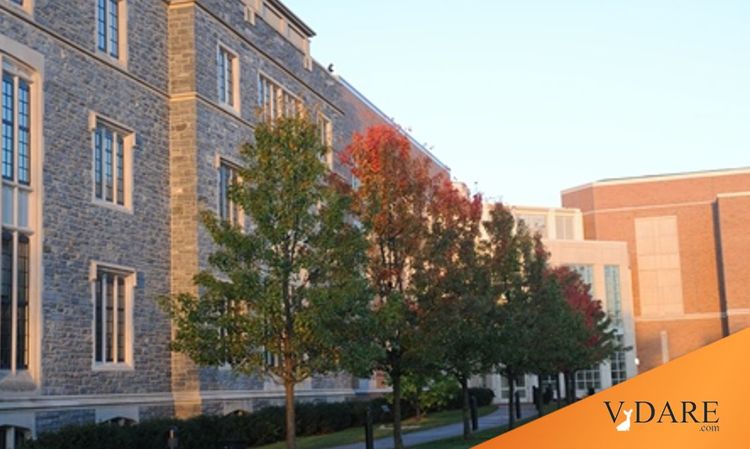
NYT’s Sexless Victims Of Sexual Abuse
By Steve Sailer
06/24/2012
Here’s the first online page of a two-page article in the New York Time on a case of sexual abuse of children that has garnered a lot of attention in upscale New York circles.
I've highlighted the Times' monomaniacal use of the sex-ambiguous terms "student" or "students" to denote the victims without mentioning whether they were male or female. Normally, I excerpt, but here’s the entire first page so you can see the contortions:
Retired Horace Mann Teacher Admits to Sex With Students
By JENNY ANDERSON
Caption: Mr. Lin, in a 1984 yearbook, is a former English teacher at the Horace Mann School who said he had sex with "maybe three" of his students.
Tek Young Lin was revered at the Horace Mann School. He was different from other teachers — a Buddhist who carefully tended to his elaborate gardens, a chaplain and a cross-country coach. He was so beloved that the English department chairmanship was named in his honor.
Since the publication of a New York Times Magazine article about sexual abuse at the school, accusations against former teachers who are still alive have surfaced online.
But there was something else about Mr. Lin: a focus he placed on certain students, a fascination that some said looked like infatuation.
Last week, in an interview, Mr. Lin, now 88, acknowledged that there was something to those whispers. He said he had had sex with students, “maybe three, I don’t know,” crossing boundaries he said were not so clear years ago.
“In those days, it was very spontaneous and casual, and it did not seem really wrong,” he said.
A New York Times Magazine article this month that exposed sexual abuse at Horace Mann, a preparatory school in the Bronx, has spurred thousands of alumni to express their feelings online and a number of victims to reach out to one another. Two law enforcement agencies have opened Horace Mann abuse hot lines. The school has pledged to “work together to understand what may have happened and why,” and last week, after accusations against Mr. Lin began to surface in online postings, Horace Mann removed his name from the English department chairmanship.
The teachers named in the magazine article, which recounted abuse that occurred 20 or more years ago, are all dead. But since its publication, some graduates of the school have made accusations against former teachers who are still alive, including Mr. Lin.
Because of New York’s statutes of limitations, it is unlikely that Mr. Lin could be prosecuted or sued for any actions that occurred when he was at Horace Mann; he retired voluntarily in 1986.
The Times has interviewed three former students who described inappropriate contact by Mr. Lin. One said he refused Mr. Lin’s request for sex; another said there had been physical contact, but no sex. One, who said he was 14 or 15 when the inappropriate contact began, said that Mr. Lin had sexual contact with him several times over several months, and that they had had a relationship that lasted years.
Mr. Lin, who lives near Santa Cruz, Calif., said no coercion had been used. “The only thing I can assure you of was that everything I did was in warmth and affection and not a power play,” he said. “I may have crossed societal boundaries. If I did, I am sorry.”
Thomas M. Kelly, the head of school, declined to comment directly on Mr. Lin’s statements, but a spokesman for the school’s public relations firm said: “If what Mr. Lin has told The New York Times is true, the conduct in which he says he engaged was appalling. We urge him to cooperate with law enforcement authorities.” Mr. Lin said no authorities had contacted him.
In the phone interview, which lasted about a half-hour, he cited his fading memory and his advanced age. He recalled facts like the names of four of his five headmasters and provided details about one particular encounter, most of which were confirmed by the student involved.
Mr. Lin was articulate in the interview, sometimes philosophical and a bit puzzled by the resurfacing of the past. “I’m surprised they remember,” he said, referring to the students. “It was all so casual and warm.”
The era had not yet come when a teacher would be viewed automatically with suspicion for inviting a student to his home. Sexual scandals in institutions like the Roman Catholic Church and Pennsylvania State University were still decades away.
Mr. Lin himself said he had acted “occasionally out of impulse,” adding, “In those days, the ’60s and ’70s, things were different.”
All three students cited Mr. Lin as a positive influence in their lives, even today, and seemed reluctant to speak, not wanting to hurt the reputation of a man who had opened their eyes to philosophy and literature, and whose strict grammar rules they remembered today.
Mr. Lin, whose Web site says he was born in the East Indies, came to the United States as a teenager in 1941, enlisted in the Army and served in the Office of Strategic Services, a precursor to the Central Intelligence Agency. According to Michael Lacopo, the final headmaster under which Mr. Lin served, he was working at Macy’s after the war and responded to an advertisement for Horace Mann. [Highlighting mine]
Did you notice which words are left off the first page, such as "boys," "youths," "males," etc. Obviously, there was no room for them because they had to squeeze in "student/s" a few more times.
Why the linguistic gymnastics?
Well, we can’t have people thinking this is a gay thing (because it is).
